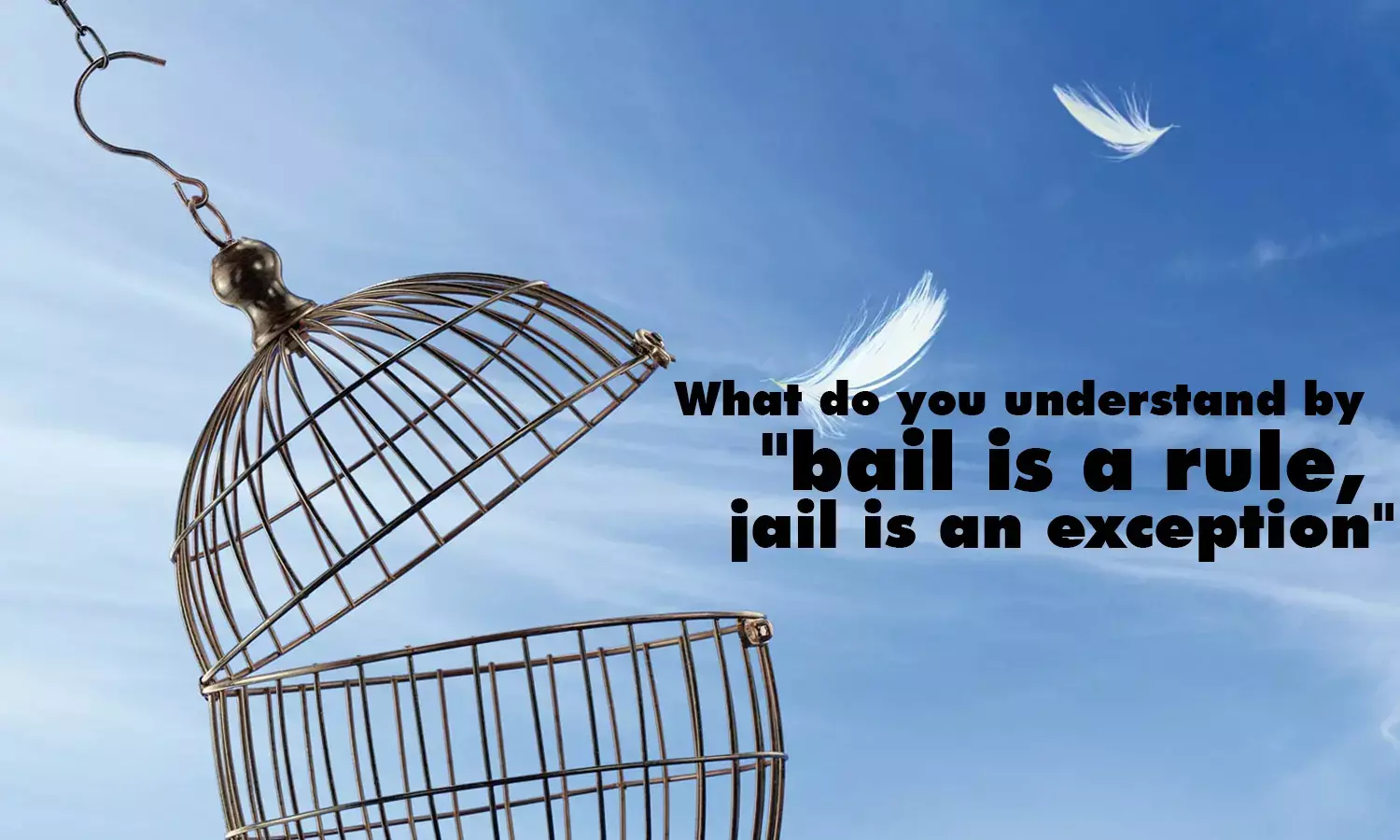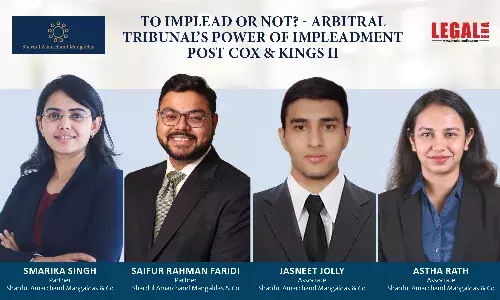What do you understand by "bail is a rule, jail is an exception"
"A person is not guilty until proven", which ensures that a person who is not guilty should not be detained. There are certain rules regarding granting the bail, for that the court follows the doctrine of "bail is a rule, jail is an exception" subject to certain conditions.;

What do you understand by "bail is a rule, jail is an exception" "A person is not guilty until proven", which ensures that a person who is not guilty should not be detained. There are certain rules regarding granting the bail, for that the court follows the doctrine of "bail is a rule, jail is an exception" subject to certain conditions. "Bail is a rule, Jail is an exception" The...
What do you understand by "bail is a rule, jail is an exception"
"A person is not guilty until proven", which ensures that a person who is not guilty should not be detained. There are certain rules regarding granting the bail, for that the court follows the doctrine of "bail is a rule, jail is an exception" subject to certain conditions.
"Bail is a rule, Jail is an exception"
The Supreme Court of India, in a landmark judgement of State of Rajasthan vs. Balchand alias Baliya (AIR 1977 2447), laid the legal doctrine "bail is a rule, jail is an exception". Justice V. Krishna Aiyer laid this legal doctrine safeguarding a fundamental right under Article 21 od the Constitution of India, granting the right to life and liberty.
The purpose of any detention is to make the accused available for the judicial proceeding, to avoid any unnecessary delays in case the accused flees away. If it is ensured that the accused shall be available for the required judicial proceedings, there is no point in detaining the accused.
What is bail?
Bail is a provisional release of an accused person who is in jail, but the crime has not been proven against him. There are three kinds of bails, and as per the requirement, the bail application is filed before the court:
• Regular Bail: The provisions of the regular bail are explained under Section 437 and Section 439 of the Indian Penal Code, to grant bail to the person in police custody.
• Anticipatory bail: Anticipatory bail can be granted only by a Session Court or High Court under the provision of Section 438 of CrPC. When a person is apprehending that he can get arrested for a non-bailable offence, he can apply for anticipatory bail.
• Interim Bail: Interim bail is bail for a short period, before granting the regular bail. For example, there is a requirement where on the humanitarian ground the court allows the accused to be free from police custody, the interim bail is granted for a limited period.
Bail doesn't get granted just by applying for it before the Court as a matter of right. There are certain grounds:
• Bail shall be granted if the investigation is not completed within the prescribed time, and the charge sheet is not submitted. The bail is granted when the Court does not have enough ground to believe that the accused has committed the crime, the trial is going on for more than 60 days or if the accused is not proven guilty or the judgement is not pronounced.
• For non-bailable offences, the court has the discretionary power to grant bail based on the facts and circumstances of the case.
Some incidents where the doctrine of "Bail is a rule, Jail is an exception"
Incident 1: Freelance journalist Mandeep Punia was released on bail by the Delhi High Court granted bail on the ground that there is no enough ground to believe that he has committed the crime.
The Court observed that the complainant, victim and witnesses all were police personnel, and Mandeep was not even in a position of influencing any of the parties.
He was accused under Section 186 (obstructing any public servant while discharging public functions), Section 353 (assault or criminal force to deter public servant from discharge of his duty) and Section 332 (voluntarily causing hurt to deter public servant from his duty) of the Indian Penal Code.
After 14 days of remand, he was granted bail.
Incident 2: The Editor-in-Chief of Republic TV, Arnab Goswami was granted bail by the Supreme Court in November 2020, who was accused of abatement to the suicide of Anvay Naik and his mother Kumud Naik.
Even after the first investigation, there was not much reliable evidence to prove that Arnab Goswami had committed the crime. Previously the interim bail petition of Arnab Goswami was rejected by the Bombay High Court.
Why jail is an exception?
Except there are some effective and believable evidence for custodial interrogation and sustained detention at the stage of pre-trial, detaining an individual and infringing his fundamental right to liberty is wrong and against the principles of natural justice. Moreover, with a rising concern and stress on Human rights preservation, the balance between the liberty of an individual and the interest of welfare has become the main concern.
Therefore, unless there are some logical reasons such as chances of the accused fleeing, where the police cannot reach or fear that the accused may tamper with the evidence or induce the witnesses, detention of the accused is against his fundamental right to liberty under Article 21 of the Constitution of India.
Therefore, the courts through the legal doctrine of "bail is a rule, jail is an exception" ensure that a person is not detained unless he is guilty of the accused crime.





